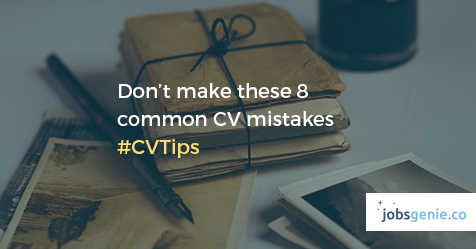Are you ready for a new challenge? Sign up for jobsgenie.co today!
Whenever you apply for a job, keep in mind the person receiving your application – whether they’re a recruiter at a recruitment agency or a company’s hiring manager – they’re most likely having to review hundreds of similar applications, sometimes across several different jobs all at the same time. That being the case, they simply haven’t got time to carefully read every single CV that comes in. As a coping mechanism and in order to work efficiently, he/she will first scan a CV for key details, maybe read the first line or two, and based solely on those initial 2 or 3 seconds– decide whether or not to continue reading further or to move the CV to the “reject” pile.
Don’t fall at the first hurdle!
Given the importance of those first few seconds, it’s super important that you don’t give the recruiter / hiring manager any reason to immediately discount your CV. There a several basics that you must get right, if you don’t I’m afraid you’re going straight into the reject pile – irrelevant of how brilliantly suitable your experience may be!
Formatting – make it look good
In today’s world image is everything, and that goes for your CV too. Make sure your CV is inviting and easy to read – there should be plenty of white space, clear headings and titles, sentences should be short and concise.
Keep in mind your 3 second window, your CV format is the very first thing that the recruiter/hiring manager sees before they’ve even read your name. It gives them an insight into your organisation skills and creativity. If their very first thought is “wow this looks ugly / hard to read / messy / boring!” you’re off to a bad start!
Splling + Gramma Mstakes are Un4givabl
So you’ve got past the first 0.5seconds with some nice formatting, it’s a shame to mess it up now because you’ve made a spelling mistake in your first sentence!! Most jobs require a high attention to detail, missing a digit or spelling something incorrectly could be the difference between gaining a new client or losing out on a big contract. If you can’t even be bothered to check that your own CV is correctly written, how can they possibly trust you with any sort of responsibility?
More formatting – no crazy colours or fonts!
Just to hammer the importance of formatting home, we’ve included it twice! Another common mistake is the use of multiple and/or “unprofessional” fonts (e.g. Comic Sans) and too many different colours. Your CV should be professional and easy to read, stick to standard fonts and limit hints of colour to exactly that – ‘hints’!
After the Scan
Reverse Chronological Order
Your CV should be written in reverse chronological order, i.e your most recent experience first. Your current job is what the person reading your CV cares about most – remember the initial scan, your current job title is one of the first things the recruiter / hiring manager will look for so make sure it’s near the top of your CV (and your formatting helps it stand out!).
Don’t leave gaps
If there are gaps in your employment history (which is fairly common) make sure you acknowledge them in your CV – it is much better to explain why there is a gap, than just to ignore it and hope the recruiter / hiring manager doesn’t pick up on it. Unexplained gaps make employers nervous, explained gaps can in some cases be beneficial – for example if you’ve taken time out to study, or travel etc.
Cut the Cliche
Your CV should be concise – it’s about getting the you skills, achievements and knowledge across as clearly and quickly as possible, there’s no need to bulk it out with cliche phrases like “great team-player with a can do attitude”. These may look good (and be true) but really employers would expect this as a given, and it doesn’t really help them understand what you specifically can bring to the table.
Lying is bad!
Lying on your CV is just plain stupid. Remember your CV is just the first step to landing a job – whilst it may seem like a good idea (not really!) to lie about your skills and / or achievements on your CV in order to help you get through the door, you’ve still got to go through an entire interview process, possible with lots of different people, and then of course do the job should you get it. You WILL get caught out, and the moment they realise you’ve been lying, you’re finished. It’s just not worth it.
Include your contact information
This one seems so incredibly obvious, but you’ll be surprised by the amount of times people forget to include any contact information on their CV!! It’s so crazy that you actually just have to laugh! You do all the hard work running the selection gauntlet and the recruiter/hiring manager decides they want to invite you in for an interview… Only to find they haven’t got any way to contact you!! Wow!

